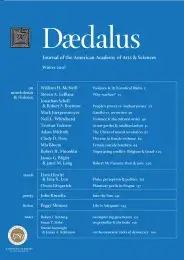Robert McNamara: then & now
But only in time can the moment in the rose-garden
. . . . . . . . . . . . . . .
Be remembered; involved with past and future.
–T. S. Eliot, “Burnt Norton” (1991)1
A singular fact about the twentieth century is this: roughly 160 million human beings were killed by other human beings in violent conflict. It was the bloodiest century in human history. Errol Morris’s Academy Award–winning documentary, The Fog of War, challenges us to look closely at that tragic century for clues as to how we might avoid a repetition of it, or worse, in this century.2
The film takes the form of a one-on-one conversation between Morris (who is behind the camera) and former U.S. Secretary of Defense Robert S. McNamara (who is on camera). The conversation traces McNamara’s experiences from the end of World War I, through the course of World War II, and the unfolding of the cold war in Cuba, Vietnam, and around the world. We are encouraged to experience pivotal moments in the twentieth century vicariously, as the filmmaker and his subject walk us through the decisions of the leaders involved in these seminal events. Archival footage and recently declassified tape recordings of presidential conversations help the viewer place McNamara, who was eighty-five years old when Morris interviewed him, in the chapters of history he discusses.
Two prerequisites made The Fog of War possible. The first is McNamara’s central role, as U.S. secretary of defense, in two momentous events of the twentieth century: the Cuban missile crisis of 1962 and the escalation of the Vietnam War in the 1960s. The second is McNamara’s intense involvement, over the past twenty years, in research projects involving not just former colleagues but also former enemies–such as the Russians, Cubans, and Vietnamese who were his counterparts at the time–as well as top scholars from the relevant countries. He has reexamined his decisions and actions as a government official to a degree and in ways that we believe are unprecedented; and he has done so by exposing himself time and again to former enemies who have not been shy about telling him exactly where they believe he was wrong and, therefore, why he should be held culpable for decisions and actions they and others regard as regrettable, even criminal. . . .
To read the full essay, access the PDF of the volume.
